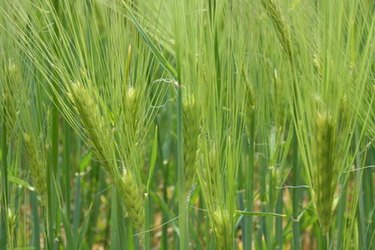Things You'll Need
Wheat seeds
Top soil
Tiller
Rake
Water

Wheat germ is the part of the lower section of the wheat plant's embryo. It is surrounded by bran and endosperm. Wheat germ is considered to be the nutrient-rich portion of the plant as it contains calcium, iron, fiber, B vitamins and omega-3 fatty acids. Grow and harvest your own wheat germ to add to baked goods, top cereals or create a healthier batter for chicken.
Step 1
Choose what type of wheat to plant depending on the time of year. Winter wheat is planted in the fall eight weeks before the ground freezes. Spring wheat is planted after the first spring thaw.
Video of the Day
Step 2
Pour a 2-inch layer of top soil on the plot. Till the soil to mix the top soil and aerate the ground.
Step 3
Broadcast the seeds across the plot by taking a handful and letting seeds go as you swing your arm from left to right. Seed dry soil lightly and moister soil more densely. Broadcast from east to west and then from north to south to ensure adequate seeding. Talk to a local garden center if you have questions regarding just how much seed is needed for your climate and for more information about the wheat variety you are planting.
Step 4
Rake the plot to cover the seeds. Winter wheat should be covered 2 to 2 1/2 inches. Spring wheat should only be covered 1 to 1 1/2 inches.
Step 5
Water modestly once per week. Wheat does not need a lot of water to grow and watering too much can adversely affect the crop.
Step 6
Harvest when the stalks turn from green to yellow to brown by snipping the heads off. As the head droops toward the ground you can test a few grains by eating them. Soft, doughy grains are not ready. Wait until the grain is firm and crunchy.
Video of the Day